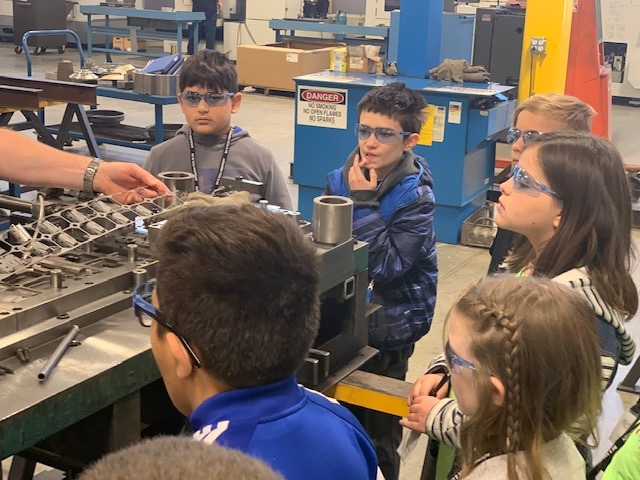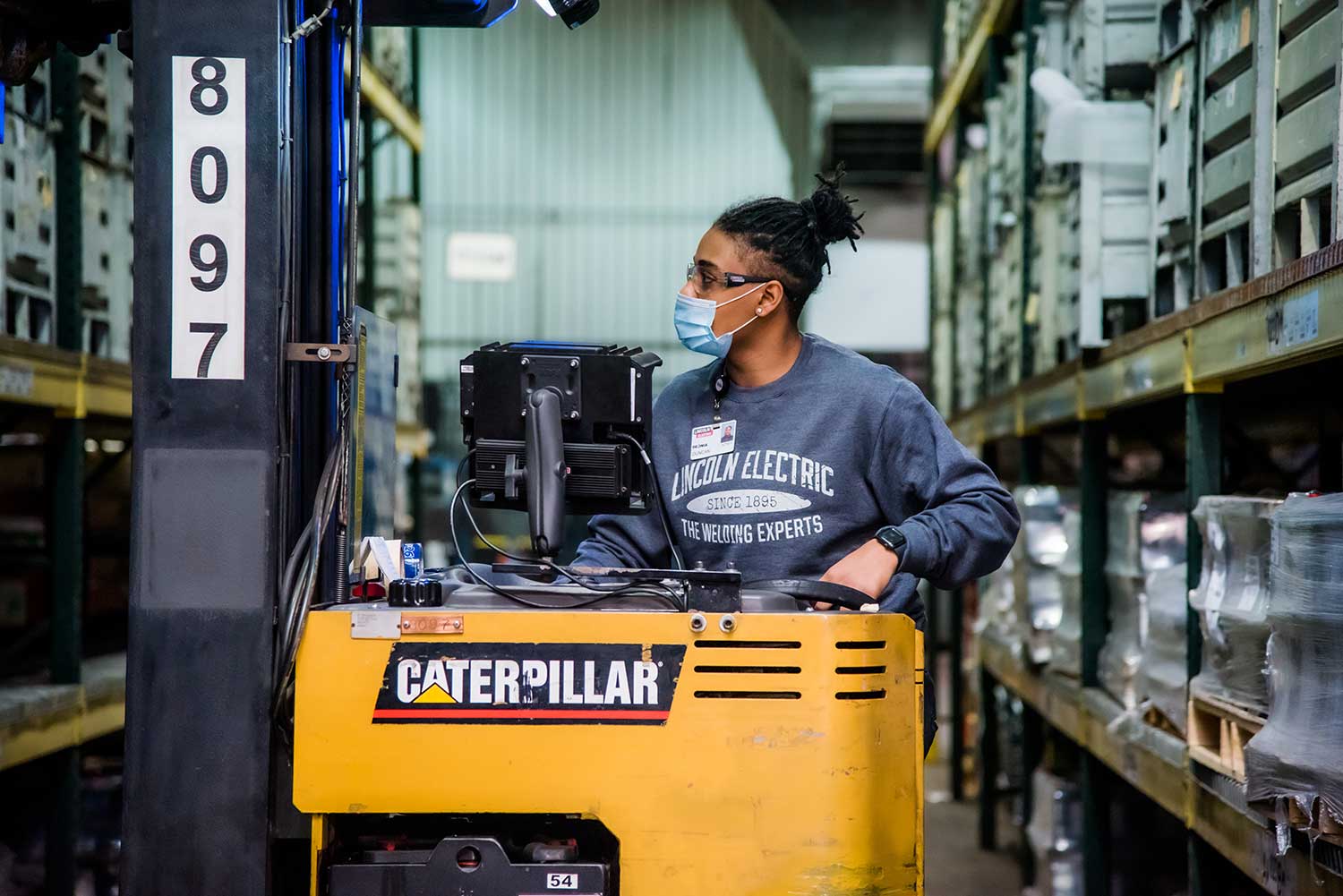Ezabarin Moore drove a city bus for 18 years and then worked hard raising four children.
“I was a stay-at-home mom, working odd jobs here and there. The money was limited. It was really limited. My children wanted things that I didn’t have the funds to give. So, I knew in order for me to give my children what they needed, I needed more money. I needed training. I needed a school. And I needed a job,” she says.
So, at 47 years old, Moore signed up for computer training at the Council for Economic Opportunities in Greater Cleveland. And there she stumbled upon the idea of a manufacturing career.
“They had brochures out, and, of course, I’m nosy. I like to read everything I see. I saw a brochure with a female welder on it and I said, ‘If she can do this, I can do it too.’ I didn’t know about manufacturing, mind you, not a thing. But I decided to give it a try.”
Until the moment she saw that brochure, Moore says she never imagined that women did those kinds of jobs in manufacturing. This lack of awareness is a big part of the problem when it comes to recruiting new talent. The manufacturing workforce is currently 74% male and 83% white. To close the talent gap, the industry recognizes it needs to increase diversity and connect with new pools of talent.
“The unemployment rate skyrocketed during the pandemic, yet there are still open positions in manufacturing. If that doesn’t tell us there is something systematically broken in our talent system, then nothing will. We’ve got to stop looking for the same talent in the same places. Manufacturing can be a positive force for good, for change. And the biggest way it can do that is by connecting people to high-tech, high paying great jobs. People of color, people who are unemployed or underemployed, people from disadvantaged communities. That is the promise of manufacturing,” says Dr. Ethan Karp, President & CEO of MAGNET.
When Moore reached out to MAGNET in 2018 after the brochure sparked her interest, she signed up for a six-week Certified Technician Program at Cuyahoga Community College. This entry-level manufacturing program is a partnership between several organizations, including MAGNET, Towards Employment, and Ohio Means Jobs. This kind of partnership works because it’s practical, flexible, and seamless for students. They receive not only manufacturing training but also financial and social support — including education in everything from job readiness basics to financial literacy. All Moore had to pay out of pocket was $100, which made the program achievable — but that doesn’t mean it was easy.
“It was a struggle. But I had a lot of backup. Everybody wanted to help and see me grow, including MAGNET and everyone else in my training. And that’s why I’m here now. Staying up all night and doing homework was the biggest struggle. It was go straight home, do the homework. You can’t sleep right now. You can’t do anything but do your mom thing and then homework. And then it was time to get up and start over. It was a juggle,” says Moore.
But it was a juggle that paid off. Moore got hired right away, and in the next year and a half, she was promoted twice.
“They welcomed me in, and I started as a molder. Then I became an inspector. Then I became a trainer. I just felt like here I am in a new career and someone likes my work for something I never knew I had talent for doing. I even won awards. So, it was real exciting. It really was.”
And Moore didn’t stop there. In 2020 she trained as a CNC operator at the Cleveland Industrial Training
Center, sponsored through funding from Ohio Means Jobs. As soon as she graduated, she was hired as a machinist at Presrite, a metal forging company in Cleveland.
“Manufacturing — the whole process — excites me every day. Just being in the manufacturing field because it’s something I’ve never done before. I use a lot of technology and tools — micrometers, calipers, drills. I feel good knowing I can walk in here and hold my head up and make a well-produced part. We precisely cut and measure gears for multiple automotive and heavy equipment companies that make the roads we commute on daily. We make parts for carnival rides. Just to name a couple. I’m fascinated by everything we do.”
Moore is proud to go to work every day knowing she’s helping make the things that run the world — and making the future brighter for her family.
“I saw the pride in my children’s eyes when I first told them I was going to school. And I’m very proud of myself let me say that. I pat myself on the back at any given time. I can actually sit back now and say, ‘Hey, if I want this, I can go and get it,’ and I don’t have to wait. So mentally it changed me but also financially — the money in manufacturing is way better than the money I had before I started. Manufacturing has changed my life. And the opportunity is there, and I think anyone can explore it — they just have to step forward and put their foot forward.”
And Moore has no plans to stop advancing. Her next step is to train as a Swiss machine operator, making very precise parts on this high-tech machine and learning how to program and repair it.
“Ezabarin is truly the future of manufacturing. Her story shows that if we make people aware of opportunities and help them gain the skills they need, it changes lives. It also shows how important collaboration is. Several different community groups, workforce organizations, companies, and schools came together to deliver seamless programs and support from start to finish, so Ezabarin wasn’t derailed by the systemic barriers that people face. This is what it takes to close the talent gap and what we need more of,” says Karp.
The manufacturing workforce is currently 74% male and 83% white
(Source: U.S. Bureau of Labor Statistics)
This requires working together to solve big, complex problems. Figuring out transportation solutions to get workers in the city to manufacturing jobs in the suburbs. Figuring out how to offer innovative training programs that are fast, flexible, and affordable. Figuring out how to give fast-food workers who need to earn a wage for their families the chance to train part time for technology careers in advanced manufacturing. Figuring out how to recruit talent that has been historically overlooked — women, people of color, returning veterans.
If Northeast Ohio gets this right, manufacturing can be a social elevator, lifting people to prosperity. With thousands more new workers like Ezabarin, the industry can close the talent gap for good — and finally have the diverse, skilled workforce it needs to grow and compete with the world.


